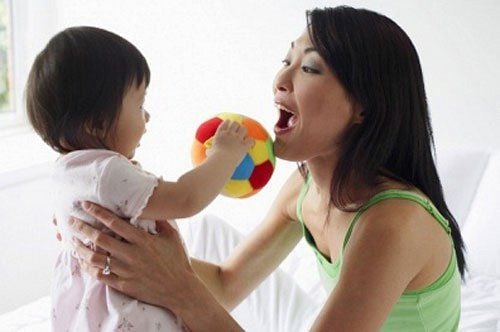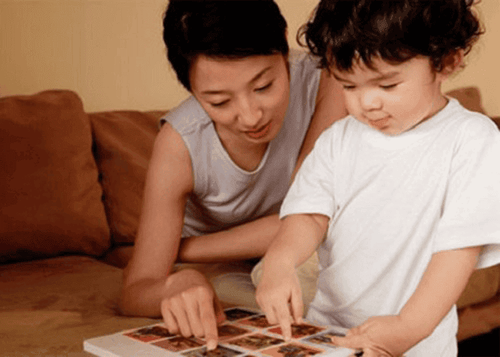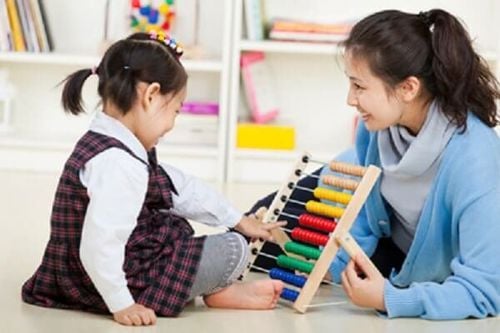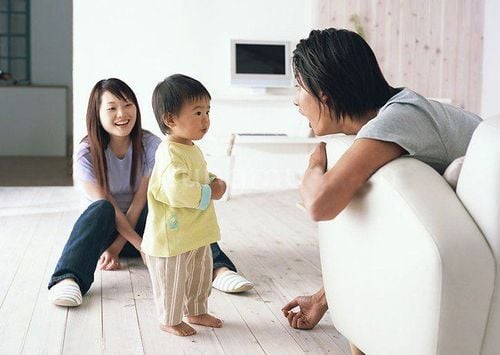This is an automatically translated article.
Talking is the most powerful way for children to interact with their surroundings. Speech development is important to a baby's development. If a child is unable to communicate verbally, he or she can easily become frustrated and even socially withdrawn.1. When do children start learning to speak?
Babies start getting used to sounds right from birth, many babies right in the womb. By the 3rd - 4th month, babies really start to talk. The process of learning to speak takes place within the first 3 years of life with constant changes that demonstrate the baby's ability to absorb and learn extremely quickly.1.1 Baby Born to 3 months old: At this time, babies often hear the soothing, lulling sounds of their mother. Your baby is just starting to make his first sounds, mostly single vowels, like ahhhh. 2 to 3 months old: The main language that comes out is crying. Crying manifests differently in different situations. As you get to know your baby, you'll be able to tell the difference between a hungry cry and a tired baby cry. 3 to 4 months: Baby makes more complex sounds and starts babbling making sounds like "muh-muh" or "bah-bah". 5 to 6 months: Your baby begins to practice intonation, volume, and pitch in response to your words and facial expressions. Attention: If your baby doesn't make sounds by 6 months, take him to see a doctor.
7 to 12 months: Baby babbles make more varied sounds. Your baby tries to imitate your words with phrases like "bah-bah-bah" or "dee-dee-dah". Attention: If your baby doesn't make a sound by 7 months old, take him to see a doctor.
=>> See more guidance from a Pediatric Speech Therapist Learn to speak with your child - 0-1 year olds
1.2 Toddlers

16 months: Baby says more words, starts calling you "mom" to get attention, nods and shakes her head for yes-no questions. Your baby begins to pronounce consonants like t, d, n, w and h. 18 months: Baby has a vocabulary of about 10-20 words, including the name "mom", some verbs and adjectives. Baby is able to say the simple phrase "want the doll". 18 to 24 months: Baby begins to say phrases of 2 or more words for more novel purposes. =>> See more guidance from a Pediatric Speech Therapist Learn to speak with your child - 1-3 years old
1.3 Preschool 24 months: Children know 50 to 100 words, using short sentences of 2 - 3 words and personal pronouns to communicate. 2 to 3 years: Baby can communicate with a basic vocabulary of 200-300 words, and expand phrases from 3 to 6 words. Note: If a 2 or 3 year old repeats your question instead of answering with frequency, take your child to the doctor. This can be an early sign of language delay.
3 to 4 years: Children often use words like "why", "what" and "who". Children can tell what happened when you left the house. Attention: Your baby may sound as if he is stuttering if he is in a state of excitement when communicating. This is completely normal. However, if the condition persists for more than 6 months, or is difficult to speak, see and talk to your doctor.
Trắc nghiệm: Nhận biết sớm dấu hiệu chậm phát triển thể chất và trí tuệ ở trẻ
Nếu 6 tuổi không biết đếm số, 7 tuổi vẫn chưa phân biệt được giữa thực tế và tưởng tượng thì có thể bé chậm phát triển thể chất và trí tuệ hơn so với bạn bè cùng lứa. Bạn đã nhận biết được các dấu hiệu bất thường sớm này chưa? Cùng làm nhanh bài trắc nghiệm sau để trang bị thêm kiến thức cho mình nhé!
The following content is prepared under supervision of Thạc sĩ, Bác sĩ y khoa, Ma Văn Thấm , Nhi , Phòng khám Đa khoa Quốc tế Vinmec Dương Đông(Phú Quốc)
2. Basic principles when teaching children to speak
2.1 Smile and attention You should encourage your baby to try to communicate with you with care and love:
Smile often at your baby, especially when he's trying to talk to you. Watch your baby babble and smile, instead of looking away, interrupting, or talking to others. Be patient as you try to decipher your infant's nonverbal conversation, such as facial expressions and babbling that can signal if your baby is sad or happy. Make time to care and love your baby, even when you're busy with other things.

2.2 Imitate Baby By imitating your baby, you're sending an important message: "I'm trying to understand you better." There are back-and-forth conversations that teach your baby how to talk. Mimic your baby's pronunciation, "ba-ba" or "goo-goo," then wait for your baby to make another sound and repeat it. Do your best to respond, even if you don't understand what your baby is trying to say. Enhance communication by smiling and mirroring facial expressions. 2.3 Talk to your baby often Babies love to hear you talk, especially with a warm, happy voice. Babies learn to speak by imitating the sounds they hear around them. So the more you talk to your baby, the faster he will develop speaking skills. Many adults use a distinctive tone of voice when speaking with children such as high-pitched voices with exaggerated expressions or imitations of a female voice.
Improve listening skills by talking to your baby regularly throughout the day, recounting your activities with your baby. Talk while you're feeding, dressing, holding, and bathing your baby, so your baby begins to associate these language sounds with everyday objects and activities. Repeat simple words like "mama" and "papa" often and clearly so your baby begins to hear familiar words.
3. Tips to teach your baby to talk

4. What to do when suspecting that a child has a speech delay?
If you are concerned about your baby's language development, talk to your GP or health visitor. If necessary, the doctor will refer you to the speech therapy department. You can also take your baby to a speech therapist yourself for a timely check-up.Psychological Health Clinic - Vinmec Times City International General Hospital has the function of examining, consulting and outpatient treatment of psychological and mental health problems. With modern equipment, Vinmec Psychological Clinic is currently cooperating with experienced experts. Along with the implementation of psychological tests, intensive psychotherapy for diagnosis and treatment, in order to bring the best medical examination and treatment effect..
For children to be healthy and develop well, it is necessary to have a nutritious diet in terms of quantity and quality balance. If children are not provided with adequate and balanced nutrients, it will lead to diseases of excess or lack of nutrients, which adversely affect the comprehensive development of children in terms of physical, mental and motor skills.
Children who do not eat properly are at risk of micro-mineral deficiency causing anorexia, growth retardation, malabsorption,... If they notice the above signs, parents should supplement their children with products. The supplement contains lysine, essential micro-minerals and vitamins such as zinc, chromium, selenium, and B vitamins to help fully meet the nutritional needs of children. At the same time, these essential vitamins also support digestion, enhance nutrient absorption, help improve anorexia, and help children eat well.
Parents can learn more:
Signs of zinc deficiency in children
Micronutrient deficiency and failure to gain weight in children
Please regularly visit Vinmec.com website and update useful information to take care of your child. Take care of the baby and the whole family.














